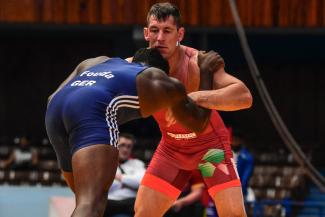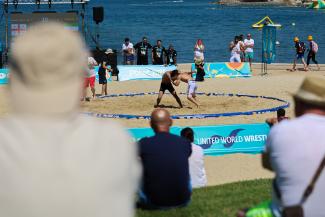Olympic Champion Borrero Wows Home Crowd To Make Granma Cup Finals
Sunday, February 18, 2018 - 03:10 By

HAVANA, Cuba – The heavy hitters emerged as day one of the Granma Cup Greco-Roman scrap came to a close on Saturday evening in Cuba’s illustrious capitol city.
Havana raved the return of its Olympic champion, Ismael BORRERO MOLINA (CUB), who competed in front of his home-country crowd for the first time since the Rio Games.
Competing eight kilograms above the weight class in which he won his Olympic gold medal, Borrero Molina navigated his way through three bouts to qualify for tomorrow afternoon’s final at 67kg.
He tackled a pair of countrymen to kick off his day, downing Damian CRISTIAN (CUB), 5-1, and Miquel MARTINEZ (CUB), 3-2. Hitting his stride in round three, Borrero Molina executed a sweeping five-point arm throw to pin Alejandro SANCHO (USA) in just over one minute.
Borrero Molina, also a 2015 world champion, will rematch against Martinez for the gold medal.

Three additional finals feature two competitors from the host nation of Cuba. None are larger than the 130kg final pitting 2016 Olympic silver medalist Yasmany LUGO CABRERA (CUB) opposite 2017 world bronze medalist Oscar PINO HANDS (CUB).
Both heavyweight combatants went unscored upon throughout the day, with each grabbing two individual victories. Pino Hinds earned the tougher win of the two by edging 2017 European silver medalist Balint LAM (HUN) in the semifinals, 3-0.
The past two years Lugo Cabrera and Pino Hinds have been Cuban teammates at the Pan American Championships. Both earned gold on each occasion. In fact, Lugo Cabrera has amassed a whopping seven Pan American titles dating back to 2009.
The remaining Cuba-on-Cuba finals come at 60kg between Luis ORTA (CUB) and two-time Pan American champion Javier DUMENIGO (CUB), and at 63kg with Joy MAREN (CUB) and Janier ALMENARES (CUB) earning the nod.
The 87kg final will be a rematch of the Grand Prix of Zagreb final held two weeks ago in Croatia. Two-time world bronze medalist and reigning European champion Viktor LORINCZ (HUN) and U23 world champion Erik SZILVASSY (HUN) are slated to meet in an all-Hungarian final tussle once more. Lorincz won the latest battle between the two top-tier talents.

A highly-anticipated Hungary-Cuba showdown will take place at 72kg, with 2016 world champion Balint KORPASI (HUN) meeting two-time defending Granma Cup champion Yosvani PENA (CUB) for the gold.
The electric junior world champion from the United States, Kamal BEY (USA), downed two of last year’s Pan American medalists to secure a berth in the 77kg finals against Ariel FIZ (CUB).
Two-time Pan American bronze medalist Luigi PEREZ (VENEZUELA) will be challenged by Gabriel ROSILLO (CUB) in the 97kg final contest.
The 82kg weight class featured a four-man round-robin, therefore will not have a designated gold-medal match. The last bout scheduled to be wrestled in this bracket comes with 2016 world bronze medalist Lazlo SZABO (HUN) facing Antonio DURAN (CUB). Should Szabo take this bout, he will be named champion.
Of note, Szabo won a tight, 2-0 bout over 2014 world champion Peter BACSI (HUN) in the opening round of the day. Bacsi is positioned to win the silver medal if Szabo holds serve tomorrow.
The Greco-Roman medal matches at the Granma Cup will take place at 2 p.m. (ET) on Sunday. Complete results and a live stream of the event can be found at unitedworldwrestling.org.
RESULTS: http://uww.io/NQ6AU
MEDAL MATCHES
60kg
Gold – Luis ORTA (CUB) vs. Javier DUMENIGO (CUB)
Bronze – Andrej GINC (GER) vs. Dalton ROBERTS (USA
67kg
Gold – Ismael BORRERO MOLINA (Cuba) vs. Miquel MARTINEZ (Cuba)
Bronze – Alejandro SANCHO (United States) vs. Wilexys RIVAS (Venezuela)
72kg
Gold – Balint KORPASI (Hungary) vs. Yosvani PENA (Cuba)
Bronze – Anthony SANDER (Germany) vs. Logan KASS (United States)
77kg
Gold – Ariel FIZ (Cuba) vs. Kamal BEY (United States)
Bronze – Juan ESCOBAR (Mexico) vs. Luis AVENDANO (Venezuela)
87kg
Gold – Erik SZILVASSY (Hungary) vs. Viktor LORINCZ (Hungary)
Bronze – Friedrich FOUDA (Germany) vs. Geovanis CARRERAS (Cuba)
Bronze – Kevin RADFORD (United States) vs. Daniel GREGORYCH (Cuba)
97kg
Gold – Luigi PEREZ (Venezuela) vs. Gabriel ROSILLO (Cuba)
Bronze – Monteaqudo REINIER (Cuba) vs. Hayden ZILLMER (United States)
Bronze – Kevin MEJIA (Honduras) vs. Pablo REINIER (Cuba)
130kg
Gold – Yasmany LUGO CABRERA (Cuba) vs. Oscar PINO HINDS (Cuba)
Bronze – Diego ALMENDRA (Chile) vs. Balint LAM (Hungary)
Bronze – Eduardo MORRELL (Puerto Rico) vs. Franz RICHTER (Germany)


Share your thoughts.
Comments